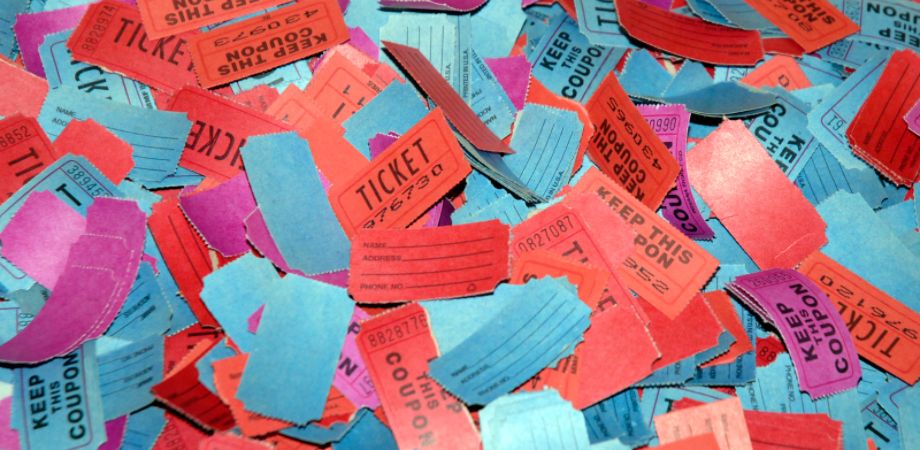What is a Chinese Auction (Tricky Tray Fundraiser)?

If you’ve been searching for fundraising ideas that are a little different, you’ve probably stumbled upon a Chinese Auction, also known as a tricky tray. At the same time, if you are still searching for one, we’re here to tell you that a Chinese Auction is a great idea for spicing up your fundraising efforts while also bringing in huge profits. You’ll have so much fun creating the event, running it and no doubt, all your guests will enjoy the fun too. So, let’s take a look at what a Chinese Auction is and how you can create your own.
The term Chinese Auction is used for a number of fundraising events, see below to see how they work.
Or if you want to jump straight into it, we can help with any prize draw or live fundraising event you are planning.
How does a Chinese Auction work?
There are two types of fundraising events that have inspired a Chinese Auction. The first is a typical raffle where you buy Chinese Auction tickets and hope that your ticket is selected to win a prize. The second is a silent auction where you bid on Chinese Auction items in private, hoping that your bid is the highest and you win the prize.
In a Chinese Auction, participants buy tickets, as many as they’d like, and then they use the tickets to bid for items that they want to win. Most Chinese Auctions sell tickets in bundles, anywhere from 25 to 100. This means that more money can be raised and more bidding can take place. Remember, you’re here to raise money, the more the better.
Using the tickets, there are a variety of ways people can place bids, but typically it will involve a pot. The pot might be in the middle of a table or sat in front of the item they wish to bid on. All tickets will have the same number on them (this will be the equivalent of having a bid number), then bidders can put as many tickets in the pots as they want (the more in there, the higher the chance of winning). The winner is selected by someone pulling out a bidding ticket at random from the pot – just like a raffle.
Why Chinese Auctions are great fundraising activities
Over the years, some may say that fundraising has become more and more difficult. It’s the same events, in the same locations and there are only so many bottles of wine you can win in a raffle. This is why Chinese Auctions are the perfect fundraising activity.
Although Chinese Auctions have been around for a long time, they’re not very common. This is partially down to how much organization they require in terms of sourcing donations and prizes. However, if you’re willing to put in the effort to get some great prizes, you’ll financially reap the rewards.
There’s nothing better than having an excuse to get dressed up and spend the evening out of the home at an event. Chinese Auctions are sophisticated events so they encourage people to dig deep into their pockets – all for a good cause of course. A night out, dressing up and the chance to win a great prize; it’s no wonder that you’re very likely to have big profits when hosting one.
How to run a Chinese Auction
Now you know what a Chinese Auction is and how they bring money in like bees to honey, it’s time to learn how to run one. It’s not as complex as you may think but it will require a plan of action, so take some inspiration from what we have to say below.
Venue selection
Due to the type of fundraising event, you might think that a Chinese Auction needs to be held in a large scale venue. However, you can downscale a Chinese Auction in whatever way you need. You can even host one virtually if necessary.
When you’re looking at venues, make sure they’re suitable for the type of event you’re trying to host and also the prizes you’re auctioning off. If you’re expecting a black-tie type of event, a school gym may not be appropriate, the same can be said if you’re hoping your guests are big spenders. Set the standards with your venue. High bidding means a high-quality venue and dramatic scenery.
At the same time, you need to make sure that your venue is suitable for the prizes you’re auctioning off. If there’s something large such as a car up for grabs, make sure the car can get into the venue so that guests can sit in it. At the same time, if you have a heavy prize like a set of weights make sure that your venue isn’t in a tall building with no elevator – the stairs may put off bidders because they don’t want to carry the prize back down. Also, if your venue is downtown, bear in mind that people may have to take their prizes back to their homes or hotels on subways.
If you’re looking to host a virtual event, all you need to do is set the stage. Although you’re not hosting a physical event you still want to make your prizes look as appealing as possible. You might want to set them on a stand and have a silky backdrop, or if they’re large, put them in a stunning location and take some favoursome pictures.
Prize selection
Possibly the most difficult part about hosting a Chinese Auction is making sure that you have some worthwhile donations for your guests to bid on. There are plenty of ways you can go about this but ultimately, it’s going to take a lot of hours so you might want to get a team together to help you out.
Going into establishments and asking them for donations is one way, but often you’ll be met with mediocre and small donations. Perfect for the smaller Chinese Auctions prizes, but they won’t be bringing in the big bucks, so you’ll need to find some big-ticket items too. This is why when it comes to getting prizes together it’s important to know and contact people who can help. There’s a good chance that sourcing desirable prizes is more of a ‘who you know’ situation, rather than ‘what you know’. And if you get stuck, you can always use us to provide some ‘wow factor’ consignment items.
Guest selection
When pulling together your list of guests, remember to invite a wide variety. You’ll need big spenders at your event as much as those who will just enjoy the experience. There needs to be a balance between the number of attendees and the volume of profit for the event to feel genuine.
Now, if you’re running your first Chinese Auction you may not know where you can find any big spending guests. Our suggestion is to invite the people who donated your big prizes. You can get a great prize, a big spending guest and offer to promote them and their company when the prize is announced as a form of free PR. A great way for everyone to benefit.
What are the rules in a Chinese Auction?
The rules for a Chinese Auction are relatively straightforward. Each person who wishes to bid on items will need to buy tickets before the auction begins. This can be done in person or via a mobile fundraising platform. These tickets then give them a number of bids that they can make throughout the evening. Unlike a silent auction, there’s no need to be secretive about how many tickets you put in the bidding bowl.
Everyone will be able to see how many tickets have been entered and decide from there how many chances at winning they want to have.
The only rule with a Chinese Auction that you need to be cautious of is that the person who selects the winner hasn’t made any bids. Having a participating guest reveal the winner can make other guests feel uneasy about the authenticity of the event.
Now you know all that you need to know about how to run a Chinese Auction, will you take the plunge for your fundraising this year? We hope so!
There you go, we hope you have found our Chinese Auction guide helpful for your event. Remember a Chinese Auction is essentially a way for you to raise funds. Your raffle tickets will help ticket sales as your guests try to bag the winning ticket. Good luck with your Chinese Auction!
Tim Stansbury
Director and Fundraising Consultant
Tim joined Givergy in 2010, overseeing the early stage growth of the business to 50 employees across five international regions, supporting over 4,000 events worldwide. With a passion for leadership, business growth and exceptional standards, Tim is at the heart of all clients needs both in the UK and worldwide.
Empowering Communities in Election Years: Top 10 Engagement Strategies
July 2, 2024
Fundraising Events: Why Technology is Just as Important as the Donors
February 29, 2024
Unique Fundraising Ideas for Easter 2024
February 29, 2024
Valentine’s Day 2024: How to Engage Donors During Seasonal Fundraising Events
January 26, 2024
The Power of Appeal Moments: Complete Guide
January 26, 2024

 USA
USA 